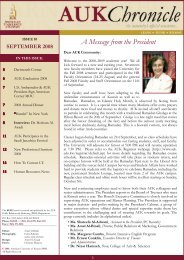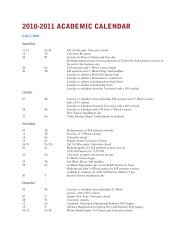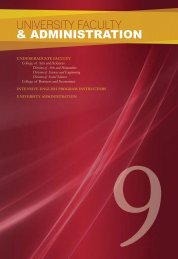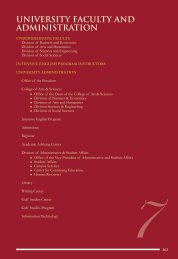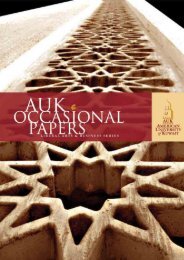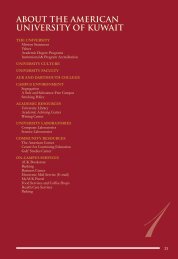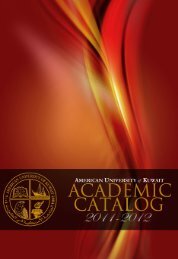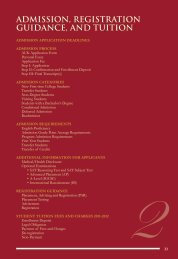memorization and repetition. This approach emphasizesacquired content while critical analysis incorporatingthe learner’s life experience is minimized. These dualframes of reference are mirrored in four learning modesthat Shahin (2005) identifies as diffuse or foreclosed fortraditional orientations and exploratory or achieved formodern orientations.A lesser examined aspect of this collective versus individualidentity dichotomy relates to the need to be acceptedas part of the collective group or risk isolation fromone’s fellow students and how this challenges academicintegrity. For example, students who engage in cheatingand plagiarism or bargaining over grades see these as actsof collective cooperation and helping out one another.The circumstances surrounding these acts are mitigatedbecause the perpetrator has a felt moral obligation to thecollective. The alternative, as noted, is to be isolated andoutcast from the group.Taken from this socially constructed perspective,as Kendall notes in her article on Kuwaiti students,personalized relations justify cheating and treating gradesas negotiable items - even though, this challenges westernviews of academic propriety:In intimate social formations, particularly in families,people make allowances for each other’s personalities andpredilections, adjusting their behaviors and discernmentsto the perceived requirements of the moment. Undersuch conditions, impartiality is impossible; under suchconditions, partiality is demanded. By contrast, wherepeople have few genuine moral obligations, where theirinteractions are casual or commercial, where they areignorant of the factors playing upon others, they havelittle basis for recognizing mitigating circumstances andhence for exercising discretion. Under such conditionsappeals to impersonal rules and abstract standards areindicative not so much of peoples’ ethical sophisticationand advance as they are indicative of their estrangement.(Kendall, 1991:101)3.6 Means for Problem ResolutionMost visitors to the Gulf region are likely to hear aboutor experience wasta. The term refers to mediation orintercession often to obtain services or some end throughpersonal connections. A distinction is made betweenintermediary wasta and intercessory wasta. The formerhas as its goal mediation to resolve inter-personal or intergroupdifferences. In contrast, intercessory wasta has asits aim a benefit for example, obtaining a driving license,reduction of a penalty, getting a job, etc.In the context of education, wasta can refer to a connectionfor the purpose of negotiating and inflating grades, usinginfluential outsiders and insiders to hire staff membersand instructors, admitting unqualified or under-achievingstudents, pressuring faculty members in various ways so thatsome students receive special consideration and bendingof the rules in favor of certain outcomes, among otherthings. “Intercessory wasta exemplifies the collective actionproblem” where action furthering “individual interestharms the collective interest” (Cunningham and Sarayrah,1994: 9). In this case, the education and re-tooling of anational workforce to participate in the global economyare being put at a disadvantage because wasta drives outcompetence based education and its emphasis on criticalthinking skills deriving from western liberal education.4.0 Research QuestionsThe above literature review suggests three general themesrevolving around knowledge, identity, and means ofproblem resolution. Specifically, these themes are: a) thephilosophical compatibility of western liberal arts withIslamic precepts concerning knowledge; b) the inherentbias towards individualist and critical forms of learningfound in western liberal education versus the collectivistic,rote forms of learning found in Islamic cultures;and c) depersonalized forms of problem resolutionwithin bureaucratic (organic) structures in contrast tothe personalized forms of problem resolution withintraditional non-bureaucratic (mechanistic) structures.In turn, these themes surrounding the establishment ofWestern-style education in the Arabian Gulf give rise tothe following issues:• How much curriculum adaptation or modification canbe accepted before liberal education becomes devoidof its premises and content?• To what extent is successful diffusion of Western-styleeducation in a local traditional, conservative settingpossible?• Who is adapting to whom? Is liberal educationadapting to its environment or vice versa?This paper focuses on the third issue because it partiallysubsumes the other two issues and in examining the issuessurrounding adaptation we can direct our attention topractical applications for the classroom and the educationsystem. In particular, the hypothesis addressed by this studyis: Intercessory wasta is being used to accommodate westernliberal education to traditional authority structures in Gulf.27
285.0 MethodologyThis study relied on the following research tools to guidethe study:a. Student questionnaire (in the appendix)b. Documents (university publications, pamphlets,meeting notes and articles)c. Participant observation of faculty, administrativepersonnel, and studentsd. Articles about the university found in local andUS newspapers.6.0 ResultsA convenience sample of 100 students, approximately 10%of the total student population, was surveyed in 8 classes.The sample had a nearly equal numbers of females (n=52)and males (n=46). There were more transfer students(51%) than first time attendees (42%) in the survey. Thehigher number of transfer students also contributes to ahigher average student age of 21.7 years, with a range from19 to 28 years of age at a time when the school was only 3years old. The most frequently cited motive for attendingthe school was to be closer to their parents’ homes (27%),followed by those who are enrolled seeking a qualityeducation (25%). A third category was created combiningthose students reporting enrollment because of low GPAs(11%), and those awaiting transfer to another school (9%)since the likely common denominator to both is a lowGPA at the time of matriculation. The mean average forcurrent GPA reported was 2.8 with a range from 1.3 to4.0. Over half of the reported GPAs (61%) were aboveC+ with 7% reporting GPAs below 2.0.Nearly half of the students in the sample (49%) likelylived and studied abroad for 1 to 5 years. The countryof residence abroad most cited was the U.S. (7%) in thecomments. Next, in order of frequency came MiddleEastern followed by European, African and Asiancountries. One student reported living in 4 countries.Among transfer students, the largest share (30%) had beenin only one other school. Another 12% had been in twoother schools. The most schools attended by a transferstudent were 8. The majority sampled (81%) indicatedthat their education was financed by their parents althougharound 22% of the students reported working and 13 %paid their own tuition and fees.Circumstantial information suggests that extended timein school and delayed completion of college degreesmay reflect a larger local trend. In casual conversationswith students, a number had spent significant amountsof time in undergraduate programs outside of Kuwait,such as Bahrain, nearly completing their majors only toreturn to Kuwait for various reasons. Given the limitedtransferability of coursework, many have few optionsother than to start over again, repeating earlier course work.One third of the students sampled reported carrying aload of 15 credit hours (33%). This is followed by thosereporting loads of 12 credit hours (28%), and 17 to 21credits hours (11%). While the average reported creditload (13.7 credit hours) seems reasonable, the average totalcredit completion rate is less than expected. Assumingan unchanging average credit load of 13.7 from the firstsemester onwards (and ignoring any validity issues for themoment), the average student would complete 54.8 in 4semesters. However, the average credit completion rate (34credits) is 62% of this projected figure (54.8). Lacking anyhard data, the course drop rates and withdrawal activitymerit further investigation, especially for their impacts onthe education process.Survey questions focused on obtaining student opinionsand rankings of various aspects of the university such asadministration/registration, professors, fellow students,activities, classrooms, and facilities. The students wereasked to identify problems within the university as wellas suggest solutions to address these problems. Overall,sampled students ranked the school as above average(42%), followed by average (37%) and below average atnearly one-fifth of the sample (18%). Among studentssurveyed, three factors were ranked above average inthe university; these include its professors (51%), fellowstudents (45%), and Information Technology (44%).Turning attention to written comments about rankings ofprofessors and students, students (n=14) identified theirfellow students as the thing that they liked best aboutthe university. In their comments; they identified theirfriendships and their peers’ helpfulness. In contrast, a fewstudents (n=4) identified the negative qualities about theirclassmates’ attitudes, i.e. their high school-like behavior,the lack of student body diversity and student proclivitiesto gossip. The professors’ friendliness and understandingwere cited in some comments (n= 7), with one studententhusiastically noting that “professors give great curves”and that classes are “easy”. Friendliness and helpfulnessratings notwithstanding, they may be equated, at some level,with instructor willingness to give students concessions ingrading and student willingness to collaborate with each
- Page 2 and 3: About AUK Occasional Papers:The AUK
- Page 4 and 5: higher education is distinguished b
- Page 6 and 7: The Impact of a Glass Ceilingon Wom
- Page 8 and 9: more women a chance to flourish in
- Page 10 and 11: consider other factors such as the
- Page 12 and 13: academically unprepared…you must
- Page 14 and 15: EmotionalSignificant variations in
- Page 16 and 17: Advising and OrientationOther impor
- Page 18 and 19: etention. However, in addition, the
- Page 20 and 21: Hadi and Llabre (1998) assessed int
- Page 22 and 23: the event was encoded in parallel a
- Page 24 and 25: Public Health Impacts of Iraq’s 1
- Page 26 and 27: college work and have inadequate pr
- Page 30 and 31: other in the pursuit of higher grad
- Page 32 and 33: for quality assurance, an organizat
- Page 34 and 35: RethinkingEntrepreneurship:Integrat
- Page 36 and 37: This type of training leads to enha
- Page 38 and 39: In short, Mount Allison students ha
- Page 40 and 41: Joplin, L. (1995). On defining expe
- Page 42 and 43: Figure 1. ExperientialEntrepreneurs
- Page 44 and 45: Kuwait - satellite television, cult
- Page 46 and 47: ReferencesAbt, V. & Seesholtz, M. (
- Page 48 and 49: interest in continuing to manipulat
- Page 50 and 51: Though corruption poses fundamental
- Page 52 and 53: A Cross-Cultural Modelof Innovation
- Page 54 and 55: were conceived as associations of c
- Page 56: others. In this case, confident pos
- Page 59 and 60: 58REFERENCESAmason, A. (1996) ‘Di
- Page 61 and 62: Shelton, C. and Darling, J. (2004)
- Page 63 and 64: 62• recycle natural resources use
- Page 65 and 66: 64Table Kuwait Fact Profile on Tran
- Page 67 and 68: Table Transportation and Associated
- Page 69 and 70: 68• Third, each mode of transport
- Page 71 and 72: 70• Prepare a Bank Group transpor
- Page 73 and 74: 7219. Stratford,A. (1974). Airports
- Page 75 and 76: 74may be developed in a safe and or
- Page 77 and 78: 28. Tables - 1 Environmental Manage
- Page 79 and 80:
6) EnvironmentalAwarenessNo baselin
- Page 81 and 82:
80Iran, the US, and HighlyEnriched
- Page 83 and 84:
82since the 1951 nationalization of
- Page 85 and 86:
8450% of the population is astonish
- Page 87 and 88:
86The US also approved the Shah’s
- Page 89 and 90:
88George W. Bush’s State of the U
- Page 91 and 92:
90when Iran could not keep up with
- Page 93 and 94:
92rich states, the decrease of natu
- Page 95 and 96:
94indigenous training. Specifically
- Page 97 and 98:
96It is important to note that Russ
- Page 99 and 100:
Table 1: Nuclear Powered States and
- Page 101 and 102:
100Foucault, Michel. “What are th
- Page 103 and 104:
102Ramazani, Rouhollah K. “Iran
- Page 105 and 106:
104My SCORE, OurMATCH: CommunityPar
- Page 107 and 108:
106with a mate while he does mechan
- Page 109 and 110:
108dimensions of life including for
- Page 111 and 112:
correlated to the commitment and on
- Page 113 and 114:
REFERENCESBryce, J, Frigo, T, McKen
- Page 115 and 116:
GDP $21,300, GDP growth rate 6.8%,
- Page 117 and 118:
• Less than half of the people su
- Page 119 and 120:
118TABLE 4: # 1 Gulf Country in Eco
- Page 121 and 122:
120• More men than women indicate
- Page 123 and 124:
TABLE 8: Why? X GenderGENDERMALE FE
- Page 125 and 126:
TABLE 11: Success in improving Livi
- Page 127 and 128:
TABLE 14: Success in preserving Cul
- Page 129 and 130:
• Gender wise, more men felt that
- Page 131 and 132:
TABLE 18: How foreign workers are t
- Page 133 and 134:
• In terms of the preference of e
- Page 135 and 136:
TABLE 24: Should Oil be the Basis f
- Page 137 and 138:
F i gur e 18: S hould K uwa it J oi
- Page 139 and 140:
13811. What do you think about the
- Page 141 and 142:
140Conditions of Kuwaiti Dependence
- Page 143 and 144:
1422) if the alien has no means of
- Page 145 and 146:
144offered Mubarak recognition as a
- Page 147 and 148:
146labor regulations and enforcemen
- Page 149 and 150:
148intensifying suspicion and hosti
- Page 151 and 152:
150Commission on Freedom of the Pre
- Page 153 and 154:
Even the viceroy of India, Lord Cur
- Page 155:
Christine PiconeAustralian College



